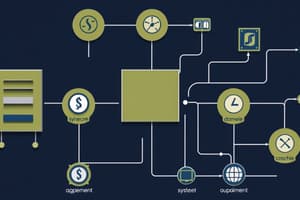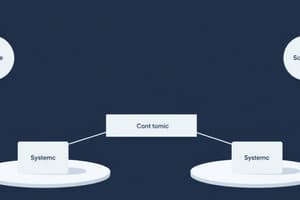Podcast
Questions and Answers
What type of components are included in a system?
What type of components are included in a system?
- Outcomes, objectives, and functions
- Interactions, allowances, and inhibitors
- Inputs, processes, and outputs (correct)
- Outputs, resources, and constraints
Which of the following best describes the primary function of a system?
Which of the following best describes the primary function of a system?
- To isolate the components from one another
- To identify and eliminate inefficiencies in workflows
- To turn raw materials into final products through various means (correct)
- To simultaneously operate multiple distinct processes
Which of these is considered an input in a system?
Which of these is considered an input in a system?
- Information processed by software
- Market trends influencing production
- Finished goods ready for distribution
- Raw materials such as data and machinery (correct)
What is a characteristic of components in a system?
What is a characteristic of components in a system?
Which of the following statements about systems is false?
Which of the following statements about systems is false?
Which of the following components are considered to be inside the boundary of an organization's system?
Which of the following components are considered to be inside the boundary of an organization's system?
Which element is NOT part of the external environment of an organizational system?
Which element is NOT part of the external environment of an organizational system?
What is the primary role of the process in a system?
What is the primary role of the process in a system?
Identifying the various external components of organizational boundaries, which of the following is included?
Identifying the various external components of organizational boundaries, which of the following is included?
Which element is responsible for determining necessary adjustments in a system?
Which element is responsible for determining necessary adjustments in a system?
Which of the following categories does NOT fall outside the organizational system boundaries?
Which of the following categories does NOT fall outside the organizational system boundaries?
In considering the boundaries of an organizational system, which of the following components would be listed as a competitor?
In considering the boundaries of an organizational system, which of the following components would be listed as a competitor?
What constitutes the outputs of a process?
What constitutes the outputs of a process?
Why is a feedback mechanism essential in a system?
Why is a feedback mechanism essential in a system?
Which of the following statements is true about the relationship between inputs and outputs?
Which of the following statements is true about the relationship between inputs and outputs?
Flashcards
System
System
A group of interconnected parts that work together for a common purpose.
System Function
System Function
The process of transforming raw materials or information into something useful.
System Inputs
System Inputs
The initial resources a system takes in to begin its process.
System Outputs
System Outputs
Signup and view all the flashcards
System Components
System Components
Signup and view all the flashcards
Process in a System
Process in a System
Signup and view all the flashcards
Feedback Mechanism
Feedback Mechanism
Signup and view all the flashcards
Inputs in a System
Inputs in a System
Signup and view all the flashcards
External Environment
External Environment
Signup and view all the flashcards
Internal Environment
Internal Environment
Signup and view all the flashcards
Organizational System Boundaries
Organizational System Boundaries
Signup and view all the flashcards
Competitive Landscape
Competitive Landscape
Signup and view all the flashcards
Political & Legal Factors
Political & Legal Factors
Signup and view all the flashcards
Study Notes
Systems Theory
-
Systems are collections of interrelated components working towards a common goal.
-
Systems transform inputs into outputs via a process.
-
System components include: input, process, output, feedback mechanism, and control mechanism.
System Characteristics
-
Systems have specific objectives.
-
Systems can exhibit complexity by including smaller subsystems.
-
Systems operate within an environment, defined by a boundary interacting with other systems and external agencies.
System Types
-
Open systems have high interaction with the environment.
-
Closed systems have limited or no interaction with the environment.
-
Coupling describes the dependency between subsystems.
-
Close-coupling means high dependency.
-
Loose-coupling means minimal dependency, offering flexibility and adaptability.
System Hierarchy
-
Systems contain subsystems, which may further have subsystems.
-
Changes in one part affect other parts due to interdependence.
System Control
-
Control systems can be open-loop (no modification after the process) or closed-loop (with feedback responsiveness).
-
Negative feedback corrects deviations. Positive feedback amplifies deviations.
Business Information Systems (BIS)
-
BIS convert data into information for decision making and organizational activities.
-
BIS resources include people, hardware, software, communications, data.
-
BIS advantages include speed, accuracy, reliability, programmability, and handling repetition.
-
BIS disadvantages include limited judgement, difficulty with innovation, and ineffectiveness with qualitative information.
-
BIS applications include data processing, process control, competitor, strategic, executive information, decision support systems, information reporting systems, operational systems, management systems, transaction processing, process control, and office automation systems.
E-Business Systems
-
E-business uses the internet for commerce, including e-commerce.
-
E-commerce types include B2B, B2C, B2G, and C2C, and M-commerce.
-
E-business benefits include cost reduction, efficiency gains, and broader markets.
Enterprise Systems
-
Enterprise systems support business processes across different functions.
-
Enterprise systems elements include ERP (Enterprise Resource Planning), CRM (Customer Relationship Management), SCM (Supply Chain Management), and SRM (Supplier Relationship Management).
Strategic Advantage through BIS
-
Competitive strategies include cost leadership, product differentiation, innovation, and focus.
-
Value chain analysis includes primary activities (production, sales, marketing, logistics) and secondary activities (HR, finance, IT).
-
Virtual value chain (VVC) uses virtual processes, customer relationships, and visibility.
-
Porter's Model addresses competitive forces (threat of new entrants, supplier power, customer power, substitute threat, rivalry) utilizing computer-based models to gain competitive advantages.
Studying That Suits You
Use AI to generate personalized quizzes and flashcards to suit your learning preferences.




